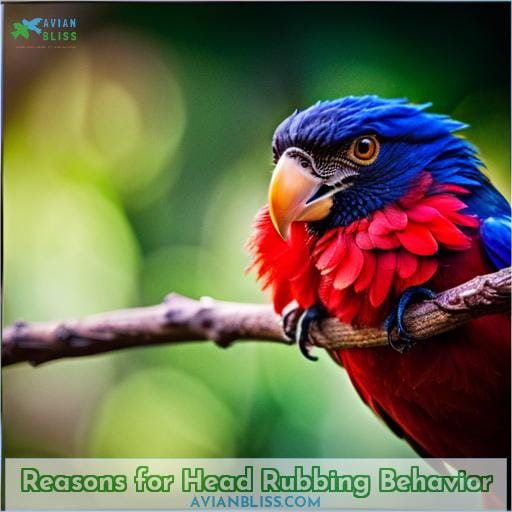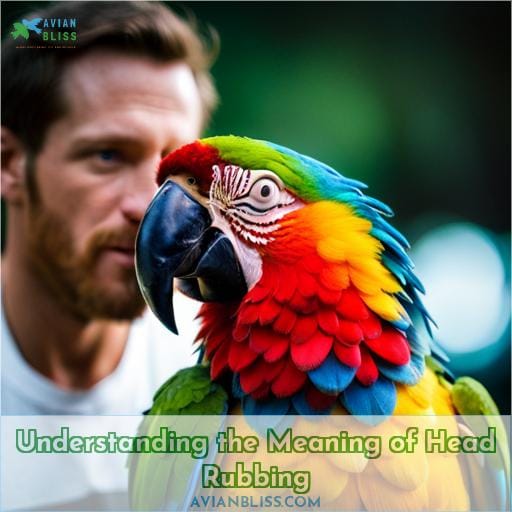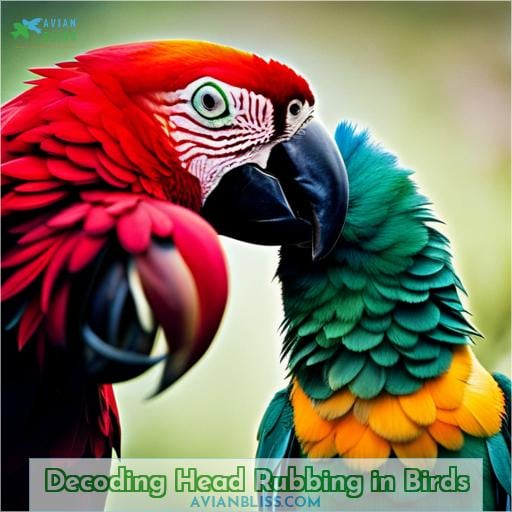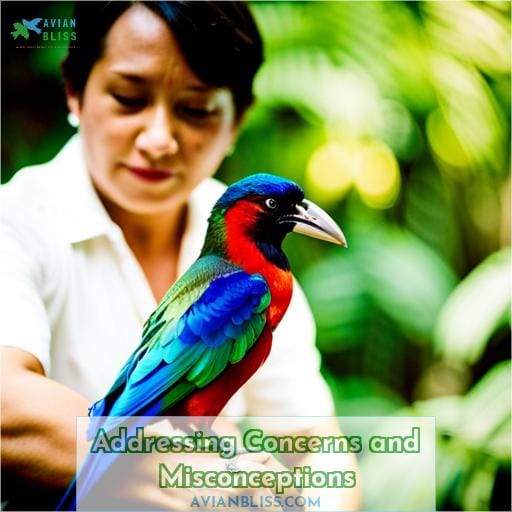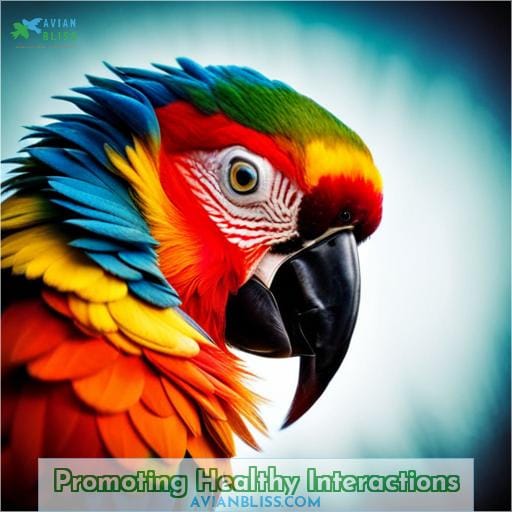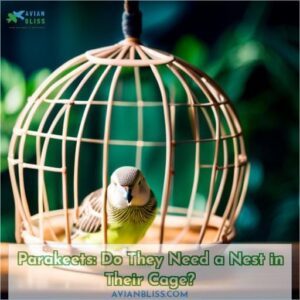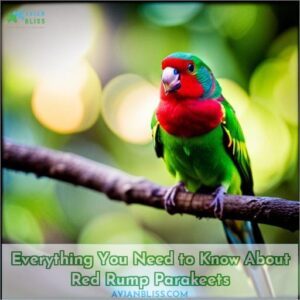This site is supported by our readers. We may earn a commission, at no cost to you, if you purchase through links.
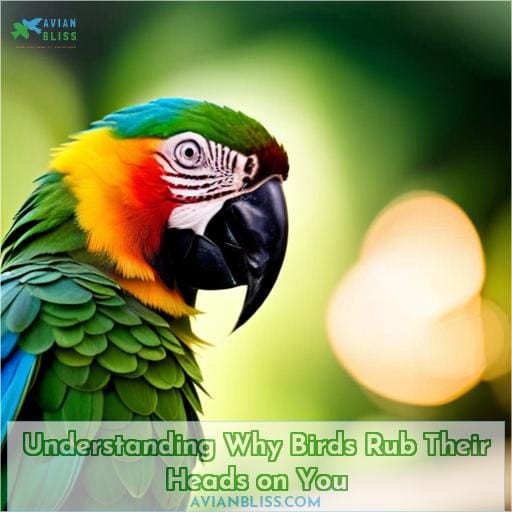 Imagine the joy of having a feathery companion who can’t help but rub their head against you.
Imagine the joy of having a feathery companion who can’t help but rub their head against you.
In this article, we will delve into the fascinating world of avian affection and explore the reasons behind why birds rub their heads on you. From seeking attention to expressing love, these gestures hold deeper meanings that strengthen your bond with your feathered friend.
So let’s unravel the mysteries together and gain a better understanding of our delightful winged companions!
Table Of Contents
- Key Takeaways
- Reasons for Head Rubbing Behavior
- Understanding the Meaning of Head Rubbing
- Decoding Head Rubbing in Birds
- Addressing Concerns and Misconceptions
- Promoting Healthy Interactions
- Seeking Professional Guidance
- Frequently Asked Questions (FAQs)
- Can head rubbing behavior in birds be a sign of aggression or dominance?
- Is it common for birds to rub their heads on inanimate objects as well?
- Are there any specific areas on a bird’s head that they prefer to rub against?
- Can head rubbing behavior in birds be a learned behavior from their human owners?
- How can I differentiate between head rubbing behavior and other types of affectionate behavior in birds?
- Conclusion
Key Takeaways
- Head rubbing behavior in birds can indicate a desire for attention, affection, and social interaction.
- It is a non-verbal communication that signifies deep emotional bonding and trust between the bird and its owner.
- It is important to differentiate head rubbing from mating behavior and set clear boundaries to avoid reinforcing demanding behavior.
- Promoting healthy interactions with birds includes spending quality time together, engaging in interactive play sessions, and providing alternative forms of bonding beyond head rubbing.
Reasons for Head Rubbing Behavior
Birds may engage in head rubbing behavior for various reasons.
One possible reason is seeking attention, where the bird wants interaction, playtime, or bonding moments with you.
Another reason could be expressing affection and care towards you.
Additionally, head rubbing behavior may also serve as a way for birds to address potential health issues such as mites or skin conditions that cause discomfort or distress.
Seeking Attention
When birds rub their heads on you, it’s often because they’re seeking attention and interaction.
This behavior can be seen as a behavioral cue indicating the bird’s need for social interaction and connection with their human companion.
By rubbing their heads on you, birds are expressing an emotional outreach towards receiving affection and attention from you.
It serves as a social cue, signaling that they desire your presence and engagement in order to fulfill their interaction needs.
Expressing Affection
Birds often rub their heads on you as a way of expressing affection towards you. This behavior is rooted in the emotional connection and social dynamics that exist between birds and humans.
By rubbing their heads against you, birds are conveying trust signals and strengthening the bond they’ve with you. It serves as a form of avian affection, allowing them to establish deeper connections with those they consider part of their flock or family unit.
Addressing Health Issues
To address potential health issues associated with head rubbing behavior, it’s important to understand the underlying reasons behind a bird’s actions.
Head rubbing can be indicative of various health concerns such as skin irritations or parasites.
If you notice excessive head rubbing or other abnormal behaviors, it’s crucial to consult an avian veterinarian who can provide guidance on proper diagnosis and treatment options.
Behavioral training, environmental enrichment, dietary considerations, and social interaction are all factors that may contribute to addressing these health concerns effectively.
Understanding the Meaning of Head Rubbing
When a bird rubs its head on you, it can have various meanings.
One possible explanation is that the bird is displaying affectionate gestures towards you, seeking to bond and show care.
Another reason could be emotional bonding, where the bird seeks comfort and reassurance from your presence.
However, it’s important to also consider potential health concerns such as mites or skin conditions that may cause the bird to exhibit head rubbing behavior.
Affectionate Gestures
As an avian enthusiast, you may have noticed that when your feathered friend rubs their head on you, it’s often a sign of affection and emotional connection.
Head rubbing in birds serves as an affectionate gesture to express bonding and trust development. It’s a form of communication that signifies emotional connectivity between the bird and its human companion.
Understanding this behavior helps strengthen the bond with your pet bird while providing them with the love and attention they desire.
Emotional Bonding
When your bird rubs its head on you, it’s expressing a deep emotional bond. This behavior is rooted in their instinctual need for social connection and communication.
Through non-verbal cues like head rubbing, birds convey their trust in you and seek comfort from your presence. These affectionate gestures serve as powerful comfort signals that strengthen the emotional connection between you and your feathered companion.
Understanding this form of bird communication enhances pet care and fosters a stronger bond with your avian friend.
Potential Health Concerns
If your bird frequently rubs its head on you, it may be trying to communicate potential health concerns.
Behavioral analysis and veterinary insights suggest that head rubbing in parrots can indicate wellness indicators or discomfort.
Careful observations of behavior changes are essential for identifying underlying issues such as mites or other skin conditions.
Understanding the meaning behind these actions can help ensure the well-being of your feathered companion.
Decoding Head Rubbing in Birds
When your bird rubs its head on you, it’s communicating its needs and seeking comfort. This behavior often indicates a desire for security and trust in their relationship with you.
By decoding this head rubbing behavior, you can better understand the emotional state of your bird and provide the necessary care to meet their needs.
Communication of Needs
To better understand why birds rub their heads on you, it’s important to decode this behavior as a means of communication for expressing their needs.
This behavior involves various behavioral cues, emotional expressions, and trust signals that provide insights into what the bird requires.
Head rubbing can indicate social bonding, beak cleaning habits, or even serve as health indications.
By deciphering these messages through observation and understanding bird needs, we can strengthen our bond with our feathered friends.
Seeking Comfort and Security
For many bird owners, the sight of their feathered friends rubbing their heads on them is a heartwarming and endearing display of affection.
By rubbing their heads on you, they’re exhibiting behavioral cues that indicate emotional needs such as trust signals.
It’s important to understand that this behavior can also be influenced by environmental factors or health issues like mites.
Providing bonding techniques and enriching your bird’s environment with foraging toys can help fulfill its need for comfort and security.
Signaling Trust and Contentment
When a bird rubs its head on you, it’s signaling trust and contentment through this affectionate gesture. This behavior reflects the bonding dynamics between birds and humans, highlighting the establishment of emotional trust.
By engaging in head rubbing, birds communicate their comfort and satisfaction in your presence. These behavioral cues serve as interactive communication that strengthens the social expressions within your relationship with your feathered companion.
Addressing Concerns and Misconceptions
Now let’s address some concerns and misconceptions surrounding why birds rub their heads on you.
One common concern is whether this behavior is related to mating, especially in young birds. It’s important to differentiate between age-appropriate actions and adult mating behaviors. Additionally, it’s crucial to avoid reinforcing demanding behavior during head rubbing interactions with your bird.
Differentiating From Mating Behavior
In the realm of decoding head rubbing in birds, it’s important to differentiate this behavior from mating behavior.
Understanding cues and behavior shifts can help distinguish between affectionate gestures and potential mating signals.
Head rubbing serves as a means of emotional bonding and trust-building rather than solely indicating sexual intentions.
It’s crucial to engage in healthy interactions with birds, providing enrichment activities while monitoring their behaviors for any changes that may require professional guidance.
Age-Appropriate Actions
As your bird grows and develops, it’s important to be mindful of age-appropriate actions when addressing concerns and misconceptions about their head rubbing behavior.
Behavioral development in birds is a complex process that involves the maturation of social skills. Understanding the boundaries of interaction with your bird will help establish healthy behavior guidelines.
By considering their level of social maturity, you can ensure appropriate responses to head rubbing while fostering a harmonious relationship with your feathered companion.
Avoiding Reinforcement of Demanding Behavior
To prevent reinforcing demanding behavior, make sure you set clear boundaries and establish consistent expectations with your bird when it rubs its head on you.
Understanding boundaries is crucial for maintaining a healthy relationship with your feathered friend. Avoid giving in to every demand, as this can encourage repetitive or excessive behaviors.
Instead, focus on positive reinforcement through behavioral training and enrichment activities that promote mental stimulation and physical exercise. Additionally, socialization tips can help build trust and strengthen the bond between you and your bird.
Promoting Healthy Interactions
To promote healthy interactions with your bird, it’s important to provide proper attention and affection.
This includes:
- Spending quality time together
- Offering gentle petting or head scratches
- Engaging in interactive play sessions
Additionally, it’s beneficial to offer alternative forms of bonding such as:
- Providing toys for mental stimulation
- Enrichment activities that encourage natural behaviors
By incorporating these practices into your daily routine with your bird, you can foster a strong bond while ensuring their physical and emotional well-being.
Providing Proper Attention and Affection
When it comes to promoting healthy interactions with your bird, it’s important to provide them with proper attention and affection.
Bonding techniques such as spending quality time together, engaging in interactive play sessions, and offering gentle petting can strengthen the emotional connectivity between you and your feathered friend.
Observing their behavioral analysis during these affectionate interactions can serve as a health indicator, allowing you to detect any potential issues early on.
Remember that demonstrating genuine care through affectionate gestures is essential for building a strong bond with your bird.
Offering Alternative Forms of Bonding
To promote healthy interactions with your bird, try offering alternative forms of bonding that go beyond head rubbing.
Bonding alternatives such as interactive play sessions, training exercises, and providing mental stimulation through puzzle toys can strengthen your relationship and enhance behavioral communication with your feathered friend.
It’s important to seek professional guidance on age-appropriate activities and address any related concerns to ensure a safe and fulfilling bond between you and your bird.
Encouraging Enrichment Activities
Continue fostering a strong bond with your bird by actively promoting healthy interactions through engaging enrichment activities.
Providing your feathered friend with enrichment toys, such as puzzle feeders or foraging toys, can stimulate their mental abilities and keep them entertained.
Incorporate playtime strategies into your daily routine, like interactive games that encourage physical activity and mental stimulation.
Additionally, consider outdoor exploration opportunities to expose your bird to new sights and sounds while providing essential exercise.
Seeking Professional Guidance
If you’re unsure about the reasons behind your bird rubbing its head on you, seeking professional guidance from avian veterinarians is recommended.
Avian veterinarians have the expertise and knowledge to assess your bird’s behavior and health, providing valuable insights into their actions.
Additionally, observing any behavior changes in your bird can help identify underlying issues or potential medical concerns that may require veterinary attention.
Understanding the individual needs of your specific bird is essential for ensuring their well-being and fostering a harmonious relationship with them.
Consulting Avian Veterinarians
If you have any concerns or questions about your bird’s head rubbing behavior, it’s advisable to consult avian veterinarians who specialize in bird health and behaviors. Veterinary insights can provide valuable guidance in understanding the underlying reasons behind this behavior.
They can conduct a thorough behavior analysis, taking into account owner experiences and community perspectives, while also considering potential health considerations that may be contributing to the head rubbing behavior.
Seeking professional guidance ensures the well-being of your feathered friend.
Observing Behavior Changes
Observe any changes in your bird’s behavior and seek professional guidance if necessary.
Behavior observation is crucial for understanding communication cues and identifying misunderstood actions. By closely monitoring your bird’s actions, you can detect any shifts that may indicate underlying issues or health concerns.
Seeking professional guidance from avian veterinarians ensures a comprehensive evaluation of your bird’s well-being and provides expert advice on promoting healthy interactions based on their individual needs.
Understanding Individual Bird’s Needs
To better understand your bird’s specific needs, seek professional guidance from avian veterinarians.
They provide personalized care and conduct behavioral analysis to help you comprehend your bird’s behavior.
Through their expertise, they can assist in identifying individual bonding patterns and offer insights into health monitoring.
Avian veterinarians will also guide you in recognizing communication cues exhibited by your bird, enabling a deeper understanding of their unique requirements for optimal well-being.
Frequently Asked Questions (FAQs)
Can head rubbing behavior in birds be a sign of aggression or dominance?
Head rubbing behavior in birds isn’t typically a sign of aggression or dominance. Instead, it often signifies affection and bonding. However, individual bird personalities and contexts should be considered for a comprehensive understanding of their behaviors.
Is it common for birds to rub their heads on inanimate objects as well?
Birds rubbing their heads on inanimate objects is a common behavior. It serves various purposes, such as:
- Marking territory
- Exploring new scents
- Seeking comfort
This instinctual action allows birds to establish their presence and fulfill their innate needs for security and familiarity.
Are there any specific areas on a bird’s head that they prefer to rub against?
When birds rub their heads on you, they typically target areas with more feathers like the cheeks or crown.
These locations provide a comforting sensation and facilitate bonding through physical contact.
Can head rubbing behavior in birds be a learned behavior from their human owners?
Head rubbing behavior in birds can be influenced by their human owners.
Birds are social creatures that learn through observation and imitation.
If they see their owners engaging in head rubbing, they may mimic this behavior as a form of bonding and affection.
How can I differentiate between head rubbing behavior and other types of affectionate behavior in birds?
Differentiating head rubbing behavior from other forms of affection in birds can be challenging.
Look for cues like:
- Eye-pinning
- Behavior changes
- The presence of other affectionate gestures
to understand your bird’s intentions better.
Conclusion
To conclude, understanding why birds rub their heads on you is essential in building a strong bond with your feathered friend.
- Seeking attention
- Expressing affection
- Addressing health issues
By decoding the meaning behind head rubbing, you can better communicate with your bird and meet their needs.
- Address concerns and misconceptions
- Promote healthy interactions
- Seek professional guidance when necessary
By doing so, you can foster a loving and enriching relationship with your avian companion.

